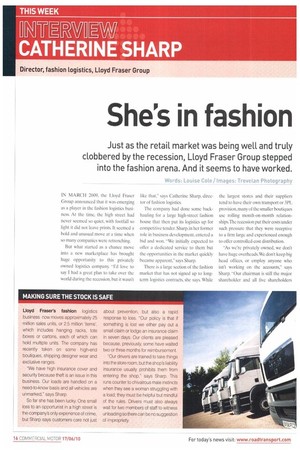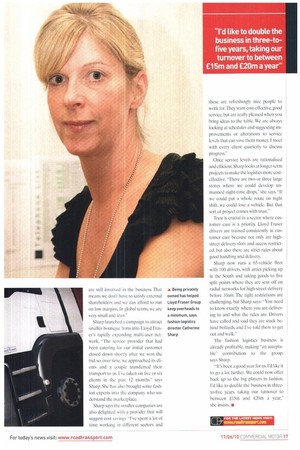She's in fashion
Page 16

Page 17

If you've noticed an error in this article please click here to report it so we can fix it.
Just as the retail market was being well and truly clobbered by the recession, Lloyd Fraser Group stepped into the fashion arena. And it seems to have worked.
Words: Louise Cote Iimages: Trevelan Photography
IN MARCH 2009, the Lloyd Fraser Group announced that it was emerging as a player in the fashion logistics business. At the time, the high street had never seemed so quiet, with footfall so light it did not leave prints. It seemed a bold and unusual move at a time when so many companies were retrenching.
But what started as a chance move into a new marketplace has brought huge opportunity to this privately owned logistics company. "I'd love to say I had a great plan to take over the world during the recession, but it wasn't like that.says Catherine Sharp, director of fashion logistics.
The company had done some backhauling for a large high-street fashion house that then put its logistics up for competitive tender. Sharp. in her former role in business development, entered a bid and won. "We initially expected to offer a dedicated service to them but the opportunities in the market quickly became apparent," says Sharp.
There is a large section of the fashion market that has not signed up to longterm logistics contracts, she says. While the largest stores and their suppliers tend to have their own transport or 3PL provision, many of the smaller boutiques use rolling month-on-month relationships.The recession put their costs under such pressure that they were receptive to a firm large and experienced enough to offer controlled-cost distribution.
-As we're privately owned, we don't have huge overheads.We don't keep big head offices, or employ anyone who isn't working on the accounts," says Sharp. "Our chairman is still the major shareholder and all five shareholders
are still involved in the business. That means we don't have to satisfy external shareholders and we can afford to run on low margins. In global terms, we are very small and lean."
Sharp launched a campaign to attract smaller boutique firms into Lloyd Fraser's rapidly expanding multi-user network. The service provider that had been catering for our initial customer closed down shortly after we won the bid, so, over time, we approached its clients and a couple transferred their transport to us. I've taken on five or six clients in the past 12 months." says Sharp. She has also brought some fashion experts into the company who understand the marketplace.
Sharp says the smaller companies are also delighted with a provider that will suggest cost savings. "I've spent a lot of time working in different sectors and these are refreshingly nice people to work for. They want cost-effective, good service, but are really pleased when you bring ideas to the table. We are always looking at schedules and suggesting improvements or alterations to service levels that can save them money. I meet with every client quarterly to discuss progress."
Once service levels are rationalised and efficient, Sharp looks at longer-term projects to make the logistics more costeffective. "There are two or three large stores where we could develop unmanned night-time drops," she says. "If we could put a whole route on night shift. we could lose a vehicle. But that sort of project comes with trust."
Trust is crucial in a sector where customer care is a priority. Lloyd Fraser drivers are trained consistently in customer care because not only are highstreet delivery slots and access restricted. but also there are strict rules about good handling and delivery.
Sharp now runs a 65-vehicle fleet with 100 drivers, with artics picking up in the South and taking goods to five split points where they are sent off on radial networks for high-street delivery before 10am. The tight restrictions are challenging, but Sharp says: "You need to know exactly where you are delivering to and what the rules are. Drivers have called and said they are stuck behind bollards. and I've told them to get out and walk."
The fashion logistics business is already profitable. making "an acceptable" contribution to the group, says Sharp.
"It's been a good year for us I'd like it to go a lot further. We could now offer back up to the big players in fashion. I'd like to double the business in threeto-five years. taking our turnover to between £15m and £20m a year," she insists. •
































































































































